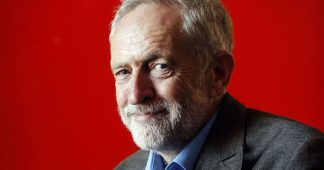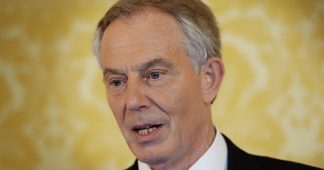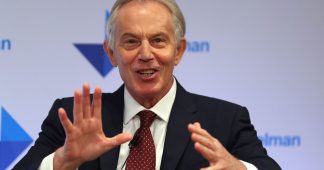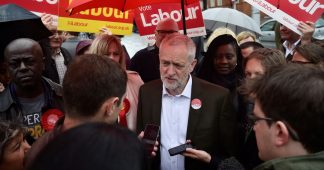Tolerance, decency and democracy are in increasingly short supply as smears mount against Labour Party leader Jeremy Corbyn
By David Hearst
29 November 2019
On 12 December, Britons will go to the polls for an election that will decide the fate of the nation for a generation.
Liberal capitalism is dying. It is failing to produce an answer to runaway global warming. Its model of economic growth is poisoning the planet and creating ever-more violent lurches of boom and bust.
It is failing as a political and social model. Politically, its chief practitioners, the centre right and centre left, have lost their ability to represent large swathes of the population. It cannot correct the wealth gap, which each year grows larger.
Failing Western states
The centre of politics has lost its ability to speak to the have-nots, those bypassed by the gig economy and globalisation. It can tweak the status quo, but it cannot, nor does it feel the need to, change it.
It produces leaders who fail – both at home and abroad – but who are nonetheless regarded as men and women of substance, despite their failures: John Major, Tony Blair, Gordon Brown, David Cameron, Theresa May, and now Boris Johnson. In contrast, those who challenge them are scrutinised and doubted for their “leadership qualities”.
Even out of office, “strong leaders” have become curiously detached from the fiascos they are responsible for. The Middle East is littered with them – Afghanistan, Iraq, Yemen, Libya, Syria.
But above all, liberal capitalism is producing failing Western states.
A failing or shrinking Western state is not one where the traffic lights stop working, water goes untreated, or the rule of law breaks down for the majority of its citizens. It is one in which the state recedes to a level of activity that becomes token and largely irrelevant.
The shrinking state is reflected in a number of ways, including local authorities who are smaller and weaker than the companies buying their land, and public services that exist on paper but not in reality.
New neoliberal norm
I will take a real case. A woman was mugged and violently assaulted recently on the doorstep of her flat in Brixton. She called 999 and was asked whether she could still see the attacker. The answer, of course, was no; he had instantly run off. She was then directed to go online to fill out a 23-page questionnaire about the incident.
The next morning, still in shock, she and her companion attempted to rouse the duty officer at the nearest police station – though not the local one, because that no longer exists. The duty officer asked her what time the attack took place. By then, it was 12 hours ago. He then told the bruised and battered victim: “How do you expect us to respond to an attack that took place 12 hours ago?”
We have all had similar, if less distressing, experiences. Just see what does not happen when your car is stolen. Or try to get someone from your local authority to answer the telephone. They are not there, because your local authority, for all intents and purposes, is largely not there either.
This is the new neoliberal norm, which the centre of politics is quite happy to perpetuate just as long as the system itself continues unaffected.
As communities and community spirit break down, identity politics takes over, transforming Britain into a series of highly active cyber groups, each of whom make up their own reality casting themselves as victims of an existential threat. Anger and feelings replace reason and evidence-based decision-making. What you feel to be true is so much more real than what you know to be true.
The fragility of this society as a tolerant, multi-ethnic, post-industrial one cannot be overstated. Its vulnerability to social disorder is real. As political discourse degenerates, the risk of politically motivated violence increases. And this is not something happening far away in the wild, exotic Middle East; it is taking place here and now, on the street next to us. The stability that post-war generations have enjoyed could be about to vanish.
High stakes
The stakes in this election could not be higher. The choice is stark. You have one candidate who will not just continue the neoliberal status quo, but deepen it with energy and relish once Britain is freed from the shackles of the EU and enters the warm embrace of a trade deal with US President Donald Trump.
His main challenger is a man who promises to overturn the neoliberal order by reintroducing the interventionist state. This is still a far cry from socialism, but it would represent real change.
Workers would be given stakes in their employer’s firms, utilities restored under public control, a Green New Deal and universal basic income established. The rich would be taxed
The first man, Johnson, is a familiar and acceptable figure to the British establishment because he is one of them: a King’s Scholar at Eton, a classicist, and a journalist whose cultivated, floppy-haired shambolism disguises a steely purpose.
His excesses – lying, the undiluted racism he has displayed in his newspaper columns – are regarded as colourful by Middle England, “box office” by the Tory party and manageable by the British establishment.
Johnson has called black Africans “piccaninnies” with “watermelon smiles”; as editor of the Spectator, he said young people had “an almost Nigerian interest in money”. He has said that Muslim women who wear the burqa look like “letter boxes” and bank robbers. He has called children of single mothers “ill-raised, ignorant, aggressive and illegitimate.”
Uneven playing field
Johnson’s words are not off-the-cuff, nor are they ill-considered. Like everything else he does, they are conscious attempts to pander to the white, working-class far-right – Trump’s backyard.
Needless to say, if anything similar had been said by the second man in this contest, Jeremy Corbyn, about Jews, he would have been lynched by now. But this is not a level playing field. A key feature of this election is that the two candidates are not being judged by the same standards. The racism that is normal and acceptable and tolerable for one, is branded as intolerable for the other.
Johnson is also a proven serial liar. Two of our public service broadcasters, BBC and Channel Four, refuse to acknowledge this, and disseminate his lies. Boris is not even his real name; it is Alex.
The second man, Corbyn – who in contrast to Johnson’s wild personal life, is moderate, principled and stubborn, almost too much so for his own good – is treated as an existential threat.
If voting changed anything, they would ban it. Well, this time, the ballot box really could. Therefore, the only real option for the coalition of business, property, legal, security, media and religious institutions that comprise the British state is to do everything they can to stop Corbyn from coming to power.
Corbyn’s campaign has been defined less by his party’s own work – a manifesto that has been well received, a party membership that is among the largest in Europe, and a well-fought campaign – as it has by the blizzard of shrapnel Corbyn has faced as leader. If they cannot play the ball, they play the man.
Self-fashioned punch bag
This is how one British contributor to Haaretz seriously describes him: “an extreme left-winger who’s never met a Jew hater he didn’t love. He hasn’t just allowed anti-Semitism to go unpunished; under his leadership, it has flourished.”
She goes on: “Corbyn has a penchant for terrorists, including those who bombed Britain during the Northern Ireland Troubles, thrives on a platform of envy and hate, and is a life-long ideological Brexiteer whose public position about Brexit, and a repeat referendum, is to pretend to sit on the fence.”
Corbyn, to be fair, has not defended himself. He was warned explicitly by his lawyer that if he did not confront in the High Court the libel that was being spread about him by public figures such as MP Margaret Hodge – who called him a racist to his face, both sheltering behind the legal privilege of the House of Commons and outside of it, in the columns of The Guardian – that this attack on him would never go away. It could never be appeased by apology. That is exactly what has happened.
Instead, Corbyn adopted, wrongly in my view, the strategy of fashioning himself into a semi-inflated punch bag. He calculated that if he made himself as soft a target as possible, his assailants would punch themselves out to the point of exhaustion.
They have not. They have only amplified their assaults on his character. It’s his head they want; nothing else matters.
Attacking Corbyn
The gap between what is now accepted and repeated as fact about Corbyn, and the truth, is wide – and smears about him matter, even if Corbyn is defeated and ousted as leader.
This is simple to demonstrate, starting with the Northern Ireland stuff, which is where I worked for five years as a correspondent for The Guardian. If Corbyn indeed has “a penchant for terrorists”, what does that make Blair, his senior adviser Jonathan Powell, or indeed a serving Conservative minister at the time, Michael Ancram?
Ancram talked to the IRA when its active service units were very active and its arsenal intact. Ancram once described to me how he sat in Bishop Thomas Daly’s front room in Derry, talking to Martin McGuinness, who was then the IRA’s chief of staff. Ancram had only a driver in the car outside as protection. The IRA showed its presence by blocking off the street at each end
Nor does Blair’s interest in “terrorists” stop in Northern Ireland. He has had long conversations with Khaled Meshaal, the former political leader of Hamas, even after his term as Middle East envoy.
I applaud Blair for engaging with Hamas, and Ancram for starting a dialogue that was to end much later in the Good Friday Agreement. But please tell me, why is Corbyn a terrorist lover and Blair treated as a hero and international statesman in Israel, giving the oration at former Prime Minister Ariel Sharon’s funeral while wearing a kippah?
And why is Corbyn, who pushed Ken Livingstone out of the party for antisemitism, a leader who permits antisemitism, whereas Blair, who let Livingstone back in, not?
Religious leaders weigh in
Before this campaign started, there were statistically far more incidents of antisemitism in Ed Miliband’s Labour Party, under a leader who was Jewish. Why is this not even mentioned?
Why is Corbyn vilified for meeting three Hamas politicians resisting eviction from Jerusalem by refusing to move from a tent, when another UK visitor to the tent that day was MP Andy Slaughter, who has somehow escaped this attention?
The apogee of the “Get Corbyn” campaign came this week, with a statement by Ephraim Mirvis, the UK’s chief rabbi. Mirvis went much further than merely claiming that the “overwhelming majority of British Jews were gripped by anxiety” at the thought of a Labour victory, and that the poison of antisemitism came from the top of the Labour Party. Mirvis, the leader of Britain’s Orthodox Jews, wrote in the The Times that Corbyn was unfit for office.
Mirvis was backed by the Archbishop of Canterbury, who echoed concerns over antisemitism, but did not single out Labour or Corbyn. Hindu, Muslim and Sikh leaders did likewise.
There are several disturbing problems with Mirvis’s action. Firstly, as the UK’s chief rabbi, he does not represent British Jewry, which is 0.5 percent of the population. Only half of those who identify as Jewish go to a synagogue. I am one of them. Mirvis does not represent me. Furthermore, Mirvis heads the United Synagogue, which represents 52 percent of UK synagogue members.
Selective outrage
The second problem is that the chief rabbi has strayed far from spiritual guidance, or indeed antisemitism itself. As a leader of a religious community, Mirvis has every right to warn against the poison of racism in British society.
But he can only exercise that right as a religious leader if he condemns racism without fear or favour wherever it occurs – be that against mosques and Muslims, within Tory ranks, or indeed from the mouth of the prime minister of Israel, Benjamin Netanyahu
Netanyahu makes no attempt to disguise or obscure the racist and discriminatory intent of his remarks when he describes the Palestinian Joint List, who are members of the Knesset, as an “existential threat” to the state of Israel, or when he welcomes with open arms known far-right leaders, such as Hungarian Prime Minister Viktor Orban, who has conducted antisemitic campaigns.
But Mirvis is extraordinarily selective in his attacks on racism. It is Corbyn, and Corbyn alone for whom he reserves his ire as a representative of a minority of a minority.
If Mirvis is thus acting not as a spiritual leader, but as a political activist, should he not declare where his political sympathies lie? Do they lie with Johnson and Netanyahu? Mirvis should answer these questions, because the distinction between religion and politics is a crucial one, and its weakening is another sign of a crumbling society. This is the basis of Western criticism of political Islam; the separation of church and state is the basis of Western secular democracy.
Legal questions
Again, the obvious questions are not being asked. If antisemitism is so prevalent in the Labour Party, why have there been so few – if any – prosecutions for hate speech by the Crown Prosecution Service (CPS)? It is a criminal offence. Is the CPS antisemitic too?
Why has this antisemitism not been tested in the civil courts either? What exactly is the legal status of the wider definition of antisemitism now being adopted, without the weight of an act of parliament? How does this definition marry with the exercise of free speech? What would happen if its wording was tested in a court of law?
In the absence of proper legal scrutiny what you have is a para judicial process akin to the ducking stool. Accusers “feel” they are wronged, therefore, they are wronged. It is, however, very real. Their “feelings” end careers and ruin reputations. Should anyone from this tight community of accusers dissent, they are made to feel it. Rabbi Mayer Weinberger, who wrote a letter of support Corbyn for “his numerous acts of solidarity with the Jewish community”, was forced to go to police, after receiving chilling threats to him and his family, if he did not withdraw the letter.
None of these basic, legal questions have been asked – and for good reason. The answers may not suit the actors and managers of a political campaign focused on preventing one man specifically from getting to power
Four years ago, a judge unseated Lutfur Rahman, the mayor of Tower Hamlets, for fixing his re-election in May 2014. One of the reasons for removing Rahman from office was that the mayor exerted “undue spiritual influence” on voters from the Muslim Bangladeshi community.
The case attracted notoriety because to argue “undue spiritual influence”, the court had to take out of the legal deep freeze a law passed in 1883, the Corrupt and Illegal Practices Act. Its purpose then was to constrain the influence of the Roman Catholic clergy on what was presumed to be the ignorant minds of the Irish voting public.
Rahman remains barred from office to this day.
Everyone loses
This week, Mirvis exerted “undue spiritual influence” on all voters, not just Jewish ones.
Far from being debarred from office, the chief rabbi’s stand has acquired the status of the gold standard of truth about antisemitism in the Labour Party.
This is a losing game for everyone: Corbyn, whose character and international status has been damaged, perhaps irreparably; British Jews torn between their liberalism and Zionism; and synagogues and mosques, which instead of supporting each other, are doubling their protection.
The biggest loser is tolerance, decency and democracy – because smears work and muck sticks.
Everyone loses. This is what is happening to Britain today.
Published at https://www.middleeasteye.net/opinion/uk-general-elections-2019-corbyn-boris-johnson-losing-game











